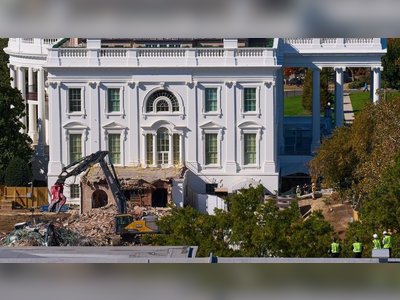
Trump Administration Proposes Elimination of Key Hospital Preparedness Fund Amid Growing State Alarm
More than two decades after its launch, the federal Hospital Preparedness Program faces termination even as states from Texas to California warn of critical readiness gaps.
A proposal now under review would eliminate the Hospital Preparedness Program (HPP) — a federal initiative created in the wake of the 11 September 2001 attacks to bolster health‐care system readiness for pandemics, cyberattacks and mass-casualty events.
Over the past 17 years the fund has distributed nearly two billion-two-hundred-million dollars to states, territories, cities and other entities to strengthen preparedness infrastructure.
The budget request submitted to Congress by the White House Office of Management and Budget, under the direction of President Donald Trump, argues that the fund “has been wasteful and unfocused” and that states and cities should “properly” fund their own preparedness efforts.
If adopted, the proposal would eliminate the approximately two-hundred-and-forty-million-dollar annual program and shift responsibility to state and local jurisdictions.
State health officials in both red and blue jurisdictions say such a move would jeopardise their emergency response capacity.
In Texas, the Department of State Health Services noted that the fund is “the main source of government funding for disaster preparedness among hospitals, EMS [emergency medical services] providers and other parts of the health-care system.” Texas received more than twenty-million dollars this year from HPP, and officials said it is unlikely the state could backfill the gap in the short term given a budget locked through August 2027.
In California — the most populous state and a major HPP recipient with nearly twenty-nine-million dollars this year — officials cautioned that without the federal programme the state risks losing critical infrastructure for emergency response, weakening its ability to protect lives, maintain continuity of care and meet federal preparedness benchmarks.
The funding also flows to local entities including counties and major health-systems.
Other states including Georgia, Illinois and New York echoed similar concerns.
Georgia, which received thirteen-point-five-million dollars this year, said it “continues to monitor and plan for potential changes to future federal funding while ensuring health-care preparedness efforts … remain strong and sustainable.” Illinois emphasised that the federally funded system “turns hundreds of hospitals, EMS and other health-care facilities into a single, coordinated system” during emergencies — a capability it said could not be replicated quickly or effectively without HPP funding.
The programme has supported critical functions such as regional health-care coalitions, surge capacity for hospitals, unified communications networks, decontamination and evacuation equipment, and training for high-consequence events.
Its cancellation would mark a significant shift in the federal role in health-security infrastructure.
The administration’s proposal forms part of a broader recalibration of federal health-and-human-services priorities.
In the proposed Fiscal Year 2026 budget, discretionary funding for the Administration for Strategic Preparedness and Response (ASPR) and other preparedness programmes would be significantly reduced; the HPP is slated for complete elimination.
Congress now faces a decision between enacting the proposal as submitted or modifying the programme’s fate.
Advocates argue the HPP remains indispensable as threats from pandemics, severe weather events and other disasters increase in complexity and frequency.
Should the programme be terminated, states warn of an elevated risk of weakened emergency response, reduced coordination across health-care systems and higher vulnerability of patients and communities during crises.
Over the past 17 years the fund has distributed nearly two billion-two-hundred-million dollars to states, territories, cities and other entities to strengthen preparedness infrastructure.
The budget request submitted to Congress by the White House Office of Management and Budget, under the direction of President Donald Trump, argues that the fund “has been wasteful and unfocused” and that states and cities should “properly” fund their own preparedness efforts.
If adopted, the proposal would eliminate the approximately two-hundred-and-forty-million-dollar annual program and shift responsibility to state and local jurisdictions.
State health officials in both red and blue jurisdictions say such a move would jeopardise their emergency response capacity.
In Texas, the Department of State Health Services noted that the fund is “the main source of government funding for disaster preparedness among hospitals, EMS [emergency medical services] providers and other parts of the health-care system.” Texas received more than twenty-million dollars this year from HPP, and officials said it is unlikely the state could backfill the gap in the short term given a budget locked through August 2027.
In California — the most populous state and a major HPP recipient with nearly twenty-nine-million dollars this year — officials cautioned that without the federal programme the state risks losing critical infrastructure for emergency response, weakening its ability to protect lives, maintain continuity of care and meet federal preparedness benchmarks.
The funding also flows to local entities including counties and major health-systems.
Other states including Georgia, Illinois and New York echoed similar concerns.
Georgia, which received thirteen-point-five-million dollars this year, said it “continues to monitor and plan for potential changes to future federal funding while ensuring health-care preparedness efforts … remain strong and sustainable.” Illinois emphasised that the federally funded system “turns hundreds of hospitals, EMS and other health-care facilities into a single, coordinated system” during emergencies — a capability it said could not be replicated quickly or effectively without HPP funding.
The programme has supported critical functions such as regional health-care coalitions, surge capacity for hospitals, unified communications networks, decontamination and evacuation equipment, and training for high-consequence events.
Its cancellation would mark a significant shift in the federal role in health-security infrastructure.
The administration’s proposal forms part of a broader recalibration of federal health-and-human-services priorities.
In the proposed Fiscal Year 2026 budget, discretionary funding for the Administration for Strategic Preparedness and Response (ASPR) and other preparedness programmes would be significantly reduced; the HPP is slated for complete elimination.
Congress now faces a decision between enacting the proposal as submitted or modifying the programme’s fate.
Advocates argue the HPP remains indispensable as threats from pandemics, severe weather events and other disasters increase in complexity and frequency.
Should the programme be terminated, states warn of an elevated risk of weakened emergency response, reduced coordination across health-care systems and higher vulnerability of patients and communities during crises.












